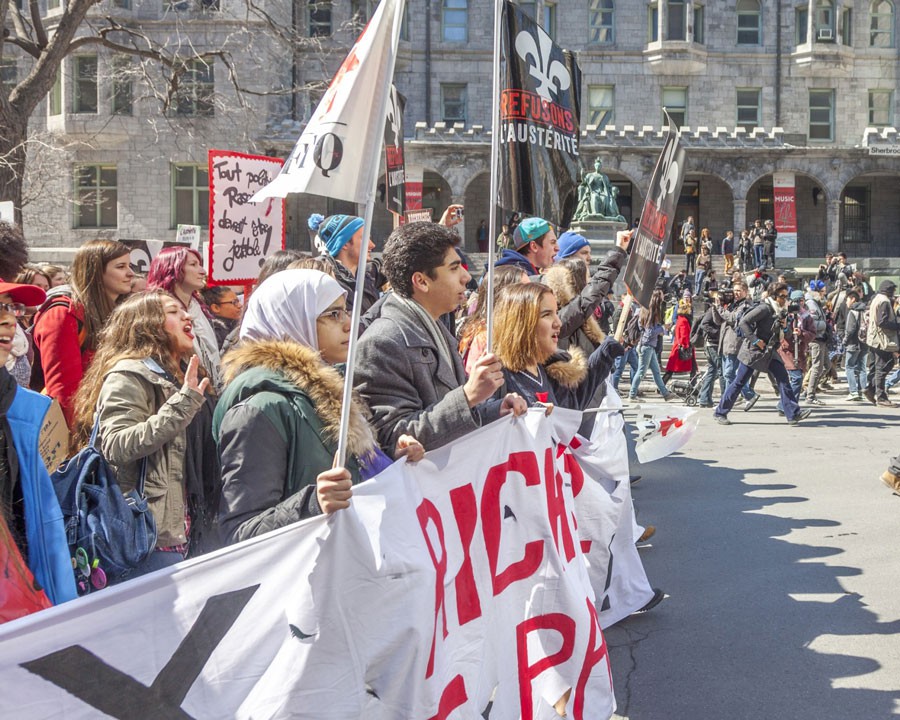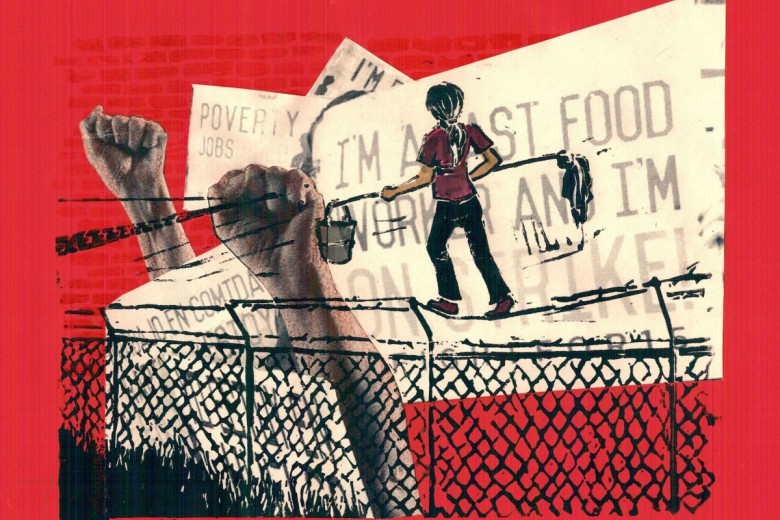
It’s not often that we see mass mobilizations against the neoliberal system of institutionalized inequality and the fossil fuel-based economy. It is rarer still to see them happening in close proximity – but that is just what is being attempted in Quebec.
The rallying cry of the spring 2015 movement, often dubbed Printemps 2015, has been opposition to the austerity measures imposed by the Liberal government of Quebec – cutting spending on public services like health care and education while also reducing the tax burden for corporations and the wealthiest citizens. But added to this message, within the Printemps 2015 mobilization, is a rejection of the petro-economy. These two cries build from the historic 2012 Quebec student strike, which effectively thwarted attempts to raise tuition rates, and from grassroots environmental movements opposing hydraulic fracturing and pipeline projects in la belle province.
The attempt to unite these two struggles – against budget cuts and against fossil fuels – raises some questions.
How can the two political fronts work together coherently? Knowing what we do about environmental destruction and climate change, is it viable to maintain an economic model based on continuous growth? And what insights can the Printemps 2015 mobilization offer to those of us outside of Quebec?
Austerity and the Earth
Bruno Massé is the coordinator of the Network of Quebec Environmental Groups (RQGE) which is primarily composed of grassroots organizations and coalitions. Throughout the winter, Massé gave public lectures on austerity and the environment, explaining how austerity means less money for environmental protection, greater difficulty enforcing environmental rules, and reduced capacity to respond to crises. In these talks, Massé emphasized that budget shortfalls, in part a product of reduced taxes, are used to justify investment in extractive projects such as mining, fracking, and oil drilling in order to boost provincial revenues. In April, for example, the Liberal government announced a subsidy of $100 million for a Chinese mining company to continue a mining operation on Inuit land in northern Quebec.
The group Climate Justice Montreal also highlights the relationship between austerity and the environment, running a bilingual workshop that combines the topics. Member Daphne Ben David says that austerity “is used to justify continued theft from Indigenous peoples and their lands. Austerity isn’t about a lack of funds,” she continues, “it is about keeping people in [precarious circumstances] and maintaining a system of uneven burdens.”
Beyond growth
A key policy document within the anti-austerity movement is known as “$10 billion in solutions.” It is produced by the Red Hand Coalition and promotes, among other things, increasing state revenues by cracking down on tax evasion and increasing corporate taxes.
But Massé asks, “Could we tax the banks a bit more to have better housing for people? That would be great, but we [also] have to ask whether the overall model of development is viable. We want to see a transition off fossil fuels, maybe an economy of degrowth. The [current] system doesn’t function. At least not for us and the environment.”
Rupert Read, a former U.K. Green Party representative and an academic, notes that discussions of wealth inequality often fail to simultaneously work toward a green economics. “A post-growth society would be forced to face the question [that] growth-ist ideology – with its promise of an ever-growing pie – allows one endlessly to evade [the question] how shall we _share_ what together we have?” The question cuts directly into the logic of austerity and capital accumulation, in which what is public or common is liquidated so that the private sphere can continue to expand.
Media representation
Mainstream media outlets have often been dismissive of the issues raised in the Printemps 2015 movement and have tended to be hostile to the protesters themselves. In this context and amid violent police repression in the streets, in April the slogan “Fuck toute” (fuck it all, or fuck everything) took hold with some in the movement. In part, the slogan stems from the recognition that the problems we are facing are so fundamental and large-scale that they require rejecting nearly everything. How does one begin to describe all the harm caused by austerity and the petro-economy?
In a widely circulated open letter, striking student Gioia Cazzaniga wrote, “[This] is to struggle to refuse to live in a country that cuts the lives of the most vulnerable to enrich those who already swallow everything, a struggle against the environmental destruction [caused] by exploiting resources known to be harmful.” “Fuck toute,” rejecting it all, is a revolutionary slogan. However, it has a nihilistic air of defeat to it and fails to articulate a compelling future vision.
While “Fuck toute” might not have appeal beyond the movement, the slogan “Aux riches de faire leur juste part” (“For the rich to do their just part”) has been prominent since at least spring 2014 and has had more traction.
Social movement realities
Organizational fissures have at times destabilized the movement in Quebec.
Just over a week into the spring student strike, the executive of ASSÉ (L’Association pour une solidarité syndicale étudiante), the most militant student union, published a preparatory “Cahier” (notebook) for their early April congress that suggested a “strategic withdrawal”: ending the strike in order to focus on mobilizing in the fall. Printemps 2015 organizers, who have no formal structure of accountability, swiftly condemned ASSÉ in a public letter insisting on pushing hard in the spring. At the congress, all of ASSÉ’s executive, and its spokesperson, stepped down from their positions.
Public-sector unions, which were no-shows in the 2012 Quebec mobilization, may be willing and able to strike in the fall of 2015, but their capacity and willingness to join a broader social movement and not merely to mobilize for their own collective bargaining purposes remains a big question. In an encouraging sign, on May 1, 2015, Quebec’s major unions contributed to a historic International Workers’ Day, organizing disruptive actions like shutting down highways and holding rallies in towns across the province.
Persistence
A social movement that does not immediately succeed in achieving all of its aims does not a failure make. The 2011 Occupy movement did not overthrow the financial system, but it did introduce the language of “the one per cent” and “the 99 per cent” into mainstream discourse, bringing social inequality to the forefront. Idle No More, while far from settling all treaty and Indigenous rights issues or even stopping Bill C-45, amplified Indigenous voices, and awakened and politicized a whole new generation of Indigenous activists. Its greatest effects may be hard to measure and still to come.
While the movement in Quebec has had trouble getting traction in mainstream media, it is nonetheless a mass movement that is bringing attention to and popularizing a systemic critique of the status quo on both economic and environmental grounds. It has already inspired initiatives like Unite Against Austerity, a campaign that hopes to spread the energy and critical analysis of the Quebec movement to the rest of Canada.
Whether an ecologically coherent anti-austerity movement can develop the strategy and capacity to win remains to be seen. But forcing more of society to turn and look in that direction is a solid start.



_780_520_90_s_c1.jpg)


